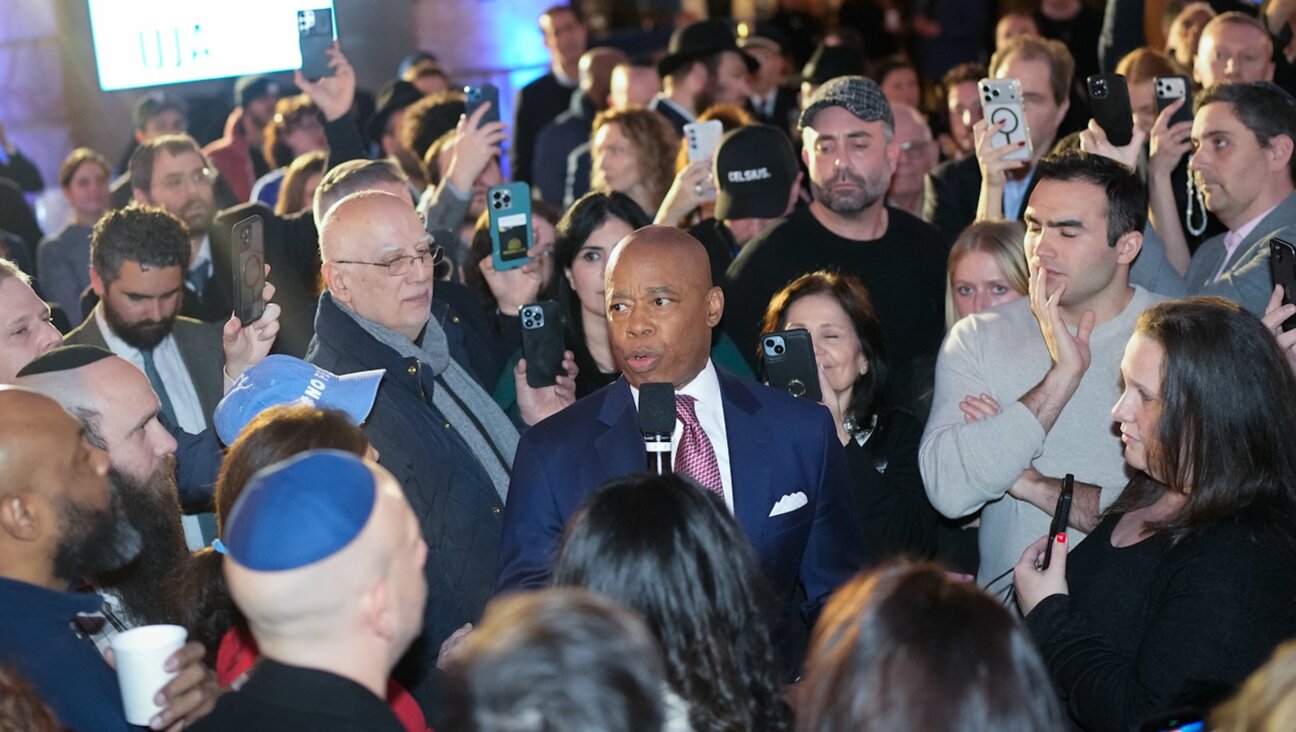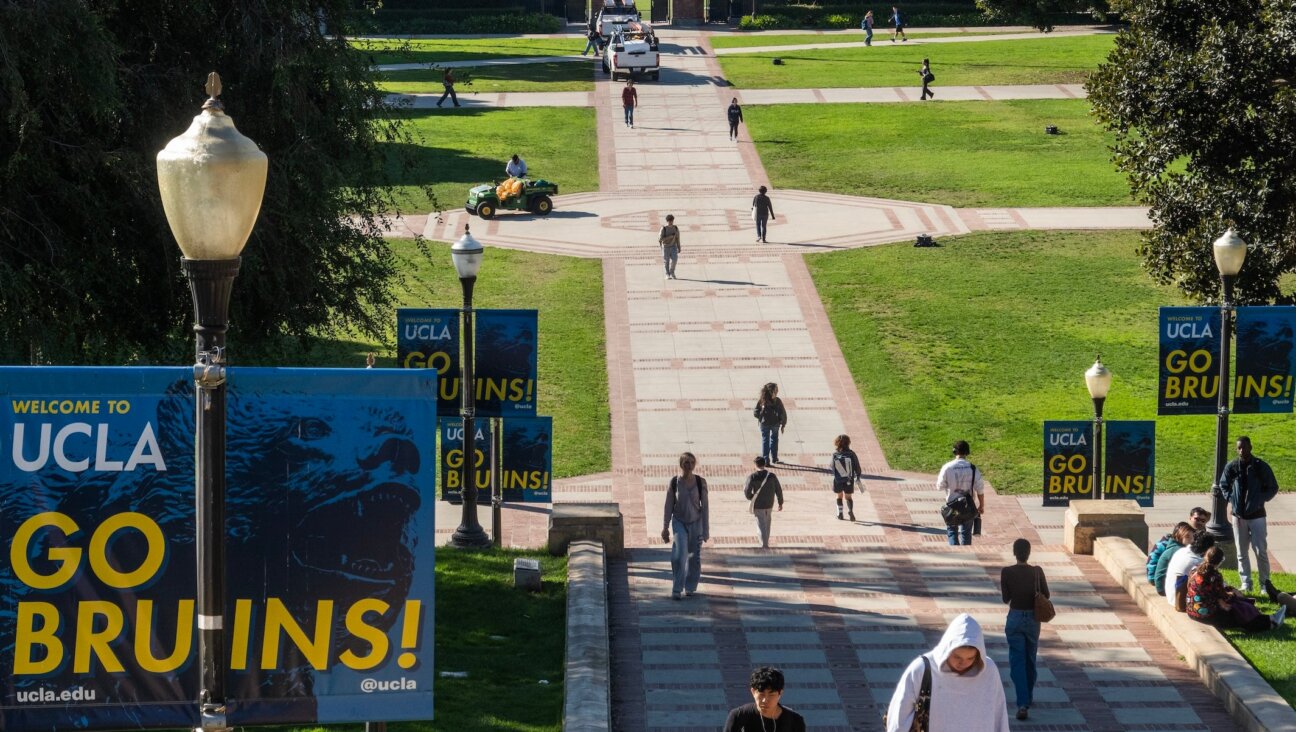Charlottesville’s Jewish Mayor Becomes Unlikely Hero Of Struggle — And Target

Graphic by Angelie Zaslavsky
Charlottesville mayor Mike Signer’s first encounter with anti-Semitism was in elementary school. In a speech earlier this year, he recalled hearing his “first hurtful ethnic slur” at the minority-majority public school he attended in Arlington, a wealthy Virginia suburb outside Washington, D.C.
But nothing prepared the 44-year-old Democratic mayor of a liberal Virginia college town for the barrage of anti-Semitic attacks hurled at him by neo-Nazis and members of the “alt-right” after he led the effort to remove a statue of Confederate general Robert E. Lee from a local park.
“That’s been a new experience for me. I’ve never seen that before,” he told the radio program “State of Belief” after the first round of hateful rhetoric was directed at him in May. “Some of them are historical tropes that I thought had been retired after World War II, and some of them are much more disturbing mashups of ideas from politics today, mixed up with regular anti-Semitism.”
Since then, Signer has emerged as a leading target of anti-Semites trying to peddle the idea that the Jews are responsible for what they view as an attempt to erase white history and the Confederate past. On Friday night, this claim manifested itself in slogans chanted by neo-Nazis as they marched through the University of Virginia campus in Charlottesville, torches in hand, calling out, “Jews will not replace us.” The next day, when “alt-right” leader Richard Spencer mentioned Signer’s name, protesters who had descended on the city responded in chants of “Jew, Jew, Jew.”
Signer has not shied away from the fight. In fact, after a woman was killed Saturday by a car allegedly driven by a white nationalist who had come to Charlottesville to protest the statue’s removal, Signer assumed the role of chief Trump critic, placing responsibility for the deadly events at the president’s feet.
“Look at the campaign he ran,” Signer told CNN’s Jake Tapper on Sunday. “Look at the intentional courting, on one hand, of all these white supremacists, white nationalists groups like that, anti-Semitic groups and look, on the other hand, [at the] repeated failure to step up, denounce, silence, put to bed all these efforts.”
Signer has now become the face of a liberal campaign aimed at calling out President Trump for his refusal to denounce right-wing extremists and to disassociate himself from members of these organizations.
“It’s good to know that leaders like Mike, who is Jewish yet doesn’t make that his political identity, are out there and unafraid to speak their minds,” said Joel Rubin, a former Obama administration official who has worked with Signer in the past. “They speak to what America is, and to what America has given to American Jews.”
Signer’s grandfather, “a Jewish kid raised in the Bronx,” as he described him, was a member of The New York Times’ proofreaders union, Signer wrote on the website promoting his books. His grandmother organized seamstresses on a factory floor, and later worked as Hannah Arendt’s secretary. Signer’s father was a journalist, and his mother was the communications director at the Religious Coalition for Reproductive Choice, in Washington. In speeches, Signer stressed his working-class background and the financial struggles his family had experienced.
Signer went to Princeton University and to the University of California, Berkeley before getting his law degree from the University of Virginia. He has been active in Democratic politics for two decades, working on the John Edwards presidential campaign as well as other races for local political heavyweights like former congressman Tom Perriello and then-governor (now senator) Mark Warner.
While Signer’s initial focus was on national security and democracy building, he shifted to domestic politics and launched his own political campaign, unsuccessfully targeting the lieutenant governor position. But in 2016 he was elected to Charlottesville’s city council, and was selected by members to serve as mayor of the 50,000-resident city.
His book “Demagogue: The Fight To Save Democracy From Its Worst Enemies” was an adaptation of Signer’s doctoral dissertation. During the 2016 presidential campaign, it suddenly became relevant. Signer accused Trump of holding classic qualities of a demagogue, stating that “Trump started becoming a demagogue when he started trying to lead a ‘silent majority’ of furious, mostly white, lower- and middle-class voters.”
Signer’s office did not respond to the Forward’s request for an interview.
Charlottesville’s battle against racism this weekend has made Signer a national hero and a noted figure in progressive Democratic circles. But while a political career beyond Charlottesville could be the next stop, Signer is now focusing on the issue at hand. And he believes he can win.
“You know, there’s blame to be had,” Signer told NPR on Sunday, “but I’m much more interested now in all forces coming together and starting the hard work that we have to turn the corner on the mainstreaming of this kind of language and thought in our country. I feel in my bones that we will do it.”
Contact Nathan Guttman at [email protected] or on Twitter, @nathanguttman

















